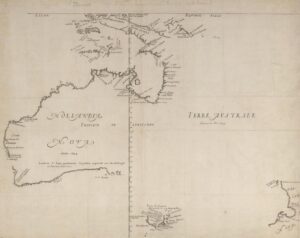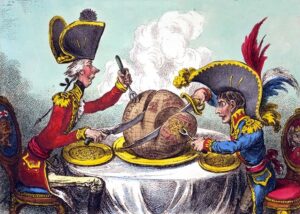1772: France Australe
July 11, 2022
By AHNZ
 Today in history, 11 July, 1772, the French claimed our country for themselves as well as re-naming New Zealand as ‘France Australe’. This act of possession was performed by the officers of murdered leader of the Terra Australis Expedition, Marion du Fresne.
Today in history, 11 July, 1772, the French claimed our country for themselves as well as re-naming New Zealand as ‘France Australe’. This act of possession was performed by the officers of murdered leader of the Terra Australis Expedition, Marion du Fresne.
This claim may well have stuck had Captain Cook not performed similar government rituals over both the North Island (November 1769) and South Island (January 1770.) It wasn’t so much that Cook and Britain wanted anything to do with New Zealand as much as that they wanted to forestall France from having the option.
All the same, 70 years later, the representatives of France and Britain, Commodore Lavaud and Captain Hobson, had plenty to discuss in July 1840 about whose land this was. And, the French would continue to have a naval base in New Zealand until mid-1846. Ref. 1840: Lavaud and Hobson Make a Deal
As to the name ‘France Australe’ it is nearly as fabricated as ‘Aotearoa’ and an insult not merely to the Dutch discoverers but to science itself. When a new animal, vegetable, mineral, or place is found the naming rights always honor the discoverer. That’s an international convention that transcends nations even when they’re at war. These French adventurers were either too arrogant to recognise this or else too much sailors whereas Cook was also an Enlightenment man who paid his intellectual debts. Ref. 1647: New Zealand
The excuse I would accept is that New Zealand as the world knew it from Abel Tasman was not known body of islands but a two dimensional coastal area mapped from Greymouth to Cape Reinga. The oft quoted line¹ is that Cook found New Zealand a line on the map and left it an archipelago.
 So, it’s not technically unreasonable for the French to let Tasman’s name belong to Tasman’s find. And, to let their own larger discovery have their own name: France Australe.
So, it’s not technically unreasonable for the French to let Tasman’s name belong to Tasman’s find. And, to let their own larger discovery have their own name: France Australe.
This French claim over New Zealand was performed at Moturua Island in the Bay of Islands. It came in the context of the explorers having resisted a great siege from the natives weeks before. Also, the betrayal, slaughtering, and cannabalising of du Fresne and several of his crew.
They did not claim ‘New Zealand’ as Cook recently had. They claimed the continent “to the Eastward of New Zealand.” This indicates that the world (having forgotten Al-Idrisi’s Tabula Rogeriana) knew no more of our part of the world than Tasman had laid down 130 years before. If the British knew more they certainly weren’t t sharing it with the French enemy who were, at this time, doing their best to fracture the British Empire in America (the War of Independence.)
This is corroborated by the fact that the Maoris encountered by the French knew nothing of firearms.
“In the year of Grace one thousand and seventy two, the eleventh of July, we Captains and Officers of the King’s ships Le Mascarin and Marquis de Castries, have taken possession in the name of His Majesty Louis XV, our King, of the Continent to the Eastward of New Zealand, named by M. Marion DuFresne, our Commander, France Australe, being in a harbour to which he gave his name, situated 35 degrees 21 South latitude; and one hundred and seventy-one degrees of longitude observed to the East of the Paris Meridian; the Castries lying on 164 degrees. We arrived and anchored in the harbour on the fifth of May and we intend to depart therefrom on 13 July of the same year, have lost in the said harbour through assassination by the Natives of the Country, Mr Marion, two officers and twenty four men of the Crew, forming the complement of the long boat of the Castries and of our gig which we have not seen since.” – Foreign Affairs Archives, in the volume New Zealand —1772-1839. Miscellaneous Papers T.I.; Diggle, Underwater Heritage Group
“The chief asked me various questions as to the cleaning of our guns. He had seen me kill some birds, but he did not think a man could be killed in the same way.” – Jean Roux journal; Wishart (2012)
“In 1998 a metal detector was used to recover a lead sealed bottle from Australia’s Dirk Hartog Island, left in 1772 by Captain Alesene de Saint. Inside were two French coins. Maybe the Moturua Island bottle also has a lead seal or maybe coins?” – Diggle
 The act of possession involved lodging the above 1772 passage into record in France as well as burying a copy of the same within France Australe soil. It was protected within a bottle which also contained the Arms of France (image, top) and probably some French coins. It also involves the French setting up and living in a camp under the French flag for several weeks. And, planting crops and teaching the natives agriculture.
The act of possession involved lodging the above 1772 passage into record in France as well as burying a copy of the same within France Australe soil. It was protected within a bottle which also contained the Arms of France (image, top) and probably some French coins. It also involves the French setting up and living in a camp under the French flag for several weeks. And, planting crops and teaching the natives agriculture.
Despite clear instructions as to its location this historic bottle has never been revealed and our government in Wellington want to keep it that way. Plenty have looked over the years but these days permission is restricted by the Department of Conservation who have access rights all tied up in red tape. Ref. Bureaucracy and the Buried Bottle, Diggle
My guess is that the bottle was discovered and disposed of quietly by an early British government representative. Busby, in the 1830s was jumpy about the French claim. William Hobson in the 1840s, or even during his 1837 visit to the Bay of Islands, also had motive to seek and destroy any scrap of French claim. The two superpowers were carving up the world.
When Commodore Lavaud came to the Bay of Islands in 1840 it would have been a powerful legal and hegemonic symbol had he unearthed the du Fresne bottle. I think he knew. I think he looked. I think it had been tampered with in advance.
—
1 Of William Reeves, historian and politician
Image ref. What the world knew of our part of the world from Tasman. Melchisedech Thevenot; Wiki
Image ref. Napoleon and Pitt, 1805; Wiki
Ref. The Great Divide, Ian Wishart (2012)
Ref. Bureaucracy and the Buried Bottle by Lynton Diggle, Underwater Heritage Group; The Internet Archive
 Like Comment Share
Like Comment Share





